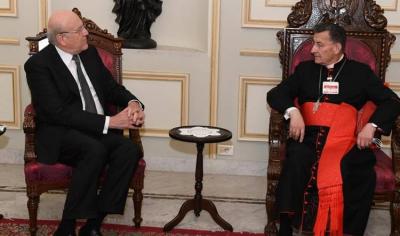A ministerial source revealed that caretaker Prime Minister Najib Mikati asked Maronite Patriarch Bechara Al-Rahi during their meeting last Monday if he was expected to resign in response to the incitement campaigns directed against him for calling the Cabinet to meet, an effort led by the head of the "Free Patriotic Movement," MP Jebran Bassil. He stated that he had no objection to staying at home, although he preferred to reside at the Maronite Patriarchate's summer residence in Deir El Qamar if a room were available to host him.
The ministerial source confirmed to "Asharq Al-Awsat" that Patriarch Al-Rahi expressed understanding of Mikati's viewpoint, wishing him to refrain from resigning and to continue leading the government in managing the affairs of the Lebanese people. The Patriarch emphasized the need for state continuity amid the difficult and exceptional circumstances Lebanon is facing, praising Mikati's role in this regard in coordinating with the ministers. This was contrary to what was stated by the Maronite Bishops Council during their monthly meeting, suggesting that the dispute could have been avoided if officials had handled it with composure, consultation, and constructive dialogue regarding essential issues concerning citizens without necessitating a Cabinet meeting.
Despite Mikati distancing himself, as the ministerial source says, from engaging in a dispute with the Maronite Bishops Council, he expressed a desire to open the door for expanding consultations with the ministers in a broader meeting to be held today. However, the catastrophic conditions in the country require not only heightened coordination but also an urgent call for the Cabinet to convene. Mikati will not hastily do this to prevent the incitement campaigns intended to drag the country into sectarian and confessional conflicts under the pretext that some are usurping the powers of the President of the Republic.
The ministerial source pointed out that the "Free Patriotic Movement," through organized incitement campaigns it sponsors against Mikati, tries to imply that calling the Cabinet to convene for urgent matters is what hinders the election of a President and disrupts parliamentary sessions dedicated to achieving the presidential entitlement. He asserted that calling the government to meet remains constitutionally sound and beyond reproach, unless the aim amid the critical conditions plaguing the country is to surrender to the status quo and refrain from managing the affairs of the Lebanese people, leading the country further into collapse.
He noted that the increasing crises Lebanon faces amid a deadlock concerning the election of a President will sooner or later compel the caretaker government to declare a state of alert to fill the void resulting from the prolonged vacancy in the presidency. He added that those who oppose or withhold support for calling the Cabinet to convene, sometimes citing constitutional constraints and at other times claiming encroachment on presidential powers, will find themselves compelled to reconsider their position by insisting on the Cabinet's timely intervention to provide at least minimal solutions to the problems that will accumulate day by day.
The same source considered that the exceptional situation prevailing in the country cannot be resolved by resorting to populist rhetoric as a mandatory passage to engage with Mikati in settling accounts due to the tension dominating his relationship with Bassil and the political team associated with former President Michel Aoun. He questioned: What would happen to the country and its political reality if Mikati decided to resign from his position? Who would intervene to manage the affairs of citizens and lead the state, especially given that the country might face incidents or urgent problems requiring appropriate decisions?
He asserted that Bassil's problem was not with Mikati but with his allies, particularly his only ally, "Hezbollah," which refuses to go along with his populist bids. The source stated that Mikati agreed in a meeting he held away from the spotlight with former Prime Ministers Fouad Siniora and Tamam Salam not to engage in political disputes with Bassil, expressing his satisfaction at the same time, as conveyed by the ministerial source, regarding the atmosphere that prevailed during his meeting with the Maronite Patriarch after he laid the points on the table in response to the media campaigns targeting him.




